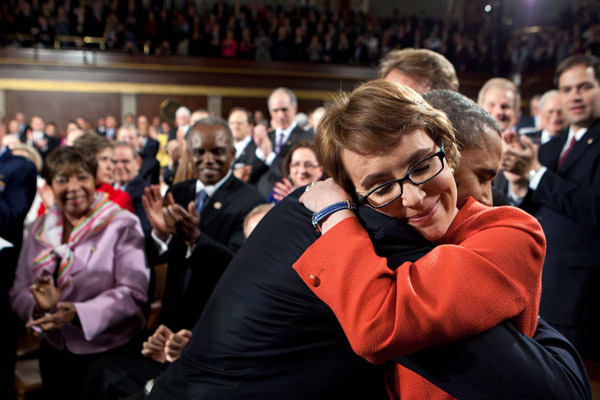
The Obama Administration just released its gun control plan (PDF), and much of it is similar to what Rahm Emanuel was pushing for on Monday at the Center for American Progress.
* The big headline? Background checks for all gun sales, with very limited exceptions; some of the stats are pretty interesting (emphasis mine):
studies estimate that nearly 40 percent of all gun sales are made by private sellers who are exempt from this requirement. A national survey of inmates found that only 12 percent of those who used a gun in a crime acquired it from a retail store or pawn shop, where a background check should have been run. Congress should pass legislation that goes beyond just closing the “gun show loophole” to require background checks for all firearm sales, with limited, common-sense exceptions for cases like certain transfers between family members and temporary transfers for hunting and sporting purposes.
I think they're referring to this study, or at least the numbers add up ("In 1997 among State inmates possessing a gun, fewer than 2% bought their firearm at a flea market or gun show, about 12% from a retail store or pawnshop").
| Source | 1997 | 1991 |
| Retail Store | 8.3 | 14.7 |
| Pawnshop | 3.8 | 4.2 |
| Flea Market | 1.0 | 1.3 |
| Gun show | 0.7 | 0.6 |
| Friends or family | 39.6 | 33.8 |
| Street/illegal source | 39.2 | 40.8 |
The decline from 1991-1997 (before and after the Brady Bill) in buys from retail stores is interesting; that decline is entirely replaced by acquisitions from friends or family. It's a bit of an old study; it would be interesting to see if that changed back after the Brady Bill reached the end of its days.
Earlier stats about juvenile offenders and students in "inner-city" high schools (PDF), from 1993, indicated that "45 percent of the inmates and 53 percent of the students would 'borrow' one from family or friends; 54 percent of the inmates and 37 percent of the students said they would get one 'off the street.'"
* Bringing back the Brady Bill and limiting clips to 10 rounds: "The case for prohibiting high-capacity magazines has been proven over and over; the shooters at Virginia Tech, Tucson, Aurora, Oak Creek, and Newtown all used magazines holding more than 10 rounds, which would have been prohibited under the 1994 law."
* They're going to smooth HIPAA to make mental-health background checks easier: "The President is calling on Congress to act on the Administration’s $4 billion proposal to help keep 15,000 cops on the street in cities and towns across the country."
Some states have cited concerns about restrictions under the Health Insurance Portability and Accountability Act as a reason not to share relevant information on people prohibited from gun ownership for mental health reasons. The Administration will begin the regulatory process to remove any needless barriers, starting by gathering information about the scope and extent of the problem.
* More data: "The Department of Justice will invest $20 million in FY2013 to give states stronger incentives to make [criminal-record and mental-health] data available. The Administration is also proposing $50 million for this purpose in FY2014, and will look for additional ways to ensure that states are doing their part to provide relevant information."
* More cops: "The President is calling on Congress to act on the Administration’s $4 billion proposal to help keep 15,000 cops on the street in cities and towns across the country."
* More research into the effect of violent video games and movies, which kind of already exists: "And the Administration is calling on Congress to provide $10 million for the CDC to conduct further research, including investigating the relationship between video games, media images, and violence."
* More mental health services: Something called Project AWARE (Advancing Wellness and Resilience in Education), which includes $15 million for "training teachers and other adults who interact with youth to detect and respond to mental illness in children and young adults" and $40 million to "help school districts work with law enforcement, mental health agencies, and other local organizations to assure students with mental health issues or other behavioral issues are referred to the services they need."
This section is led into with a reference to the Newtown, Tucson, Aurora, and Virginia Tech shootings, but all four of those were committed by young men whose mental illnesses had been recognized in some manner, and all four received treatment or were referred to it; the details of Project AWARE will be critical.
Photograph: The White House


